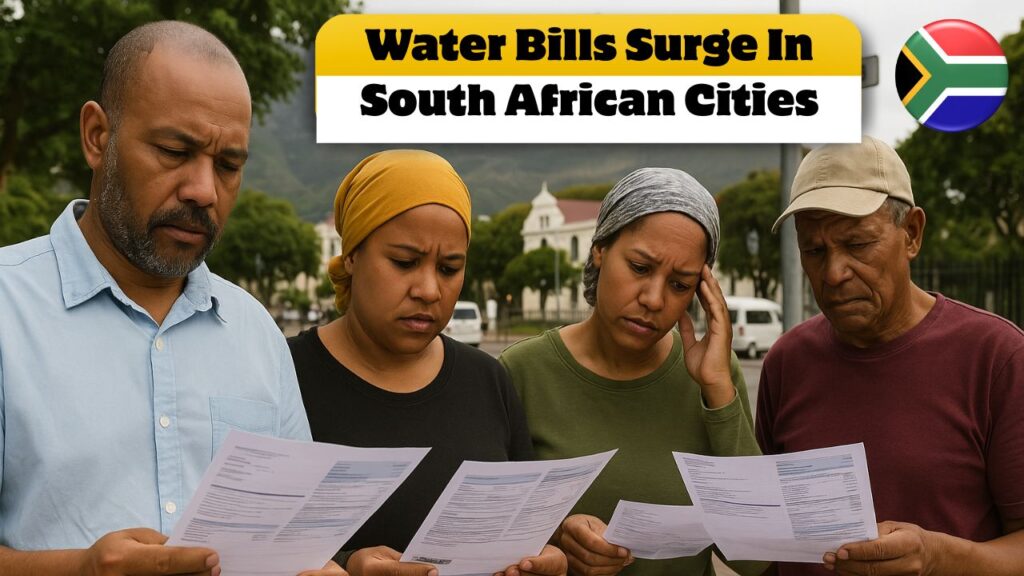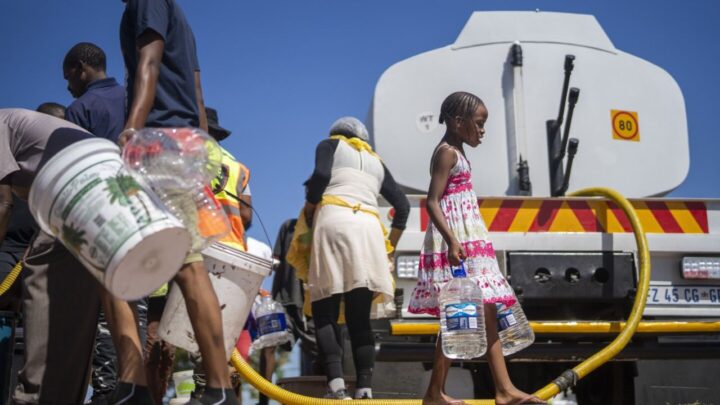South African households are set to experience an increase in their monthly expenses as new water charges have officially been announced for 2025. With growing concerns around water scarcity, infrastructure maintenance, and rising operational costs, municipalities across major cities like Johannesburg, Cape Town, Durban, and Pretoria have revised their water tariffs. The updated prices, effective from October 2025, aim to encourage responsible water usage while generating funds for long-term sustainability. Citizens are advised to review the updated pricing carefully, understand the tiered system, and adjust their household consumption accordingly to avoid excessive charges in the months ahead.

Revised Water Tariffs 2025 – Impact on South African Households
- New water rates come into effect from October 15, 2025.
- Basic residential usage (0–6 KL) will remain subsidized in some cities.
- Higher usage tiers now face steeper charges per kilolitre.
- Municipalities have justified increases due to drought response funding and infrastructure upgrades.
South African households, particularly in high-consumption zones, will see noticeable increases in their water bills under the new tariff system. The new charges vary depending on location and usage volume, following a tiered pricing structure. This means the more water you use, the more you pay per kilolitre. The tariff revision is also meant to support critical upgrades to outdated water infrastructure and to fund drought resilience programs. While some areas like Cape Town still offer limited free water usage for low-income households, others like Johannesburg have reduced the volume eligible for subsidy. These changes signal a national effort to balance access and sustainability.
How Water Charges Are Changing Across Major Cities in South Africa
- Johannesburg: Up to 10% rise in mid-tier consumption bands.
- Cape Town: Revised sliding scale now caps free water at 6KL per month.
- Durban: Average monthly bill may rise by R75 for moderate users.
- Pretoria: New surcharge introduced for above-average usage.
Each South African city has introduced unique changes to its water pricing policy. In Johannesburg, the water charges have increased by approximately 8%–10% for mid-tier usage (7KL–15KL). Cape Town continues with its block tariff system but has decreased the free basic allowance. Durban residents consuming between 10KL and 20KL can expect an average monthly hike of R75. Pretoria has added a surcharge for consumers exceeding 20KL, further discouraging waste. These changes have been publicly disclosed through municipal notices, and consumers are urged to monitor their bills carefully and implement water-saving habits to limit financial impact.
Why the South African Government Is Raising Water Prices in 2025
- National water demand is exceeding supply in key areas.
- Infrastructure repair and expansion costs are growing.
- Drought preparedness funding is urgently needed.
- Environmental regulations now mandate sustainable resource usage.
The South African government has emphasized the urgent need to raise water tariffs in 2025 to ensure the long-term viability of water services. Many water treatment plants and distribution pipelines require urgent repairs, while new investments are needed in water recycling and storage. Additionally, climate change has increased the severity and frequency of droughts, requiring new reservoirs and emergency response systems. By implementing higher water rates, the government aims to reduce wastage, support conservation, and increase funding for future infrastructure. These increases are aligned with international best practices and aim to balance financial sustainability with public access to essential services.

Tips for Reducing Your Monthly Water Bill in South Africa
- Fix household leaks and install low-flow taps and showerheads.
- Reuse greywater from laundry and dishwashing for gardening.
- Collect rainwater for outdoor use.
- Only run full loads in washing machines and dishwashers.
As water charges go up, South African families can take practical steps to control their usage and avoid high bills. Fixing common leaks in pipes and toilets can save hundreds of litres monthly. Installing low-flow taps and dual-flush toilets reduces daily consumption without affecting lifestyle. Greywater systems are affordable and allow safe reuse for irrigation. Municipalities also recommend rainwater harvesting, which can provide enough water for gardens and even some indoor cleaning needs. Smart water habits are now more important than ever—not just for reducing costs, but also for contributing to the nation’s broader conservation goals.
| City | Old Rate (per KL) | New Rate (per KL) | Free Allowance | Average Monthly Increase |
|---|---|---|---|---|
| Johannesburg | R26.03 | R28.30 | 6KL | R55–R85 |
| Cape Town | R23.97 | R25.80 | 6KL | R45–R70 |
| Durban | R21.50 | R24.00 | 0KL (none) | R75–R90 |
| Pretoria | R25.00 | R27.60 | 5KL | R50–R80 |
| Port Elizabeth | R20.80 | R22.50 | 5KL | R40–R65 |
Frequently Asked Questions (FAQs)
1. When do the new South African water charges come into effect?
The updated tariffs are effective from October 15, 2025, across most cities.
2. How can I find out my city’s updated water rates?
You can visit your local municipality’s official website for detailed tariff information.
3. Are any discounts available for low-income households?
Yes, many cities still offer subsidized or free basic water for qualifying households.
4. Can I reduce my bill by using less water each month?
Yes, the new tiered system rewards lower consumption with significantly lower charges.





